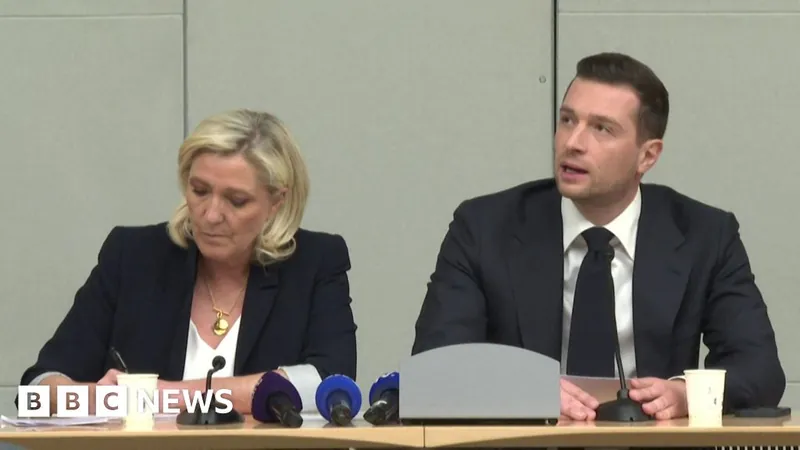
Hungary's Shocking Exit from the International Criminal Court During Netanyahu's Visit: What It Means for Global Justice?
2025-04-03
Author: Wai
Introduction
In a move that has sent shockwaves through international legal circles, Hungary has announced its withdrawal from the International Criminal Court (ICC) during Israeli Prime Minister Benjamin Netanyahu's visit to Budapest. This decision marks Hungary as the first European Union country to exit the ICC, an organization tasked with prosecuting those accused of genocide, war crimes, and crimes against humanity.
Criticism of the ICC
During a joint press conference with Netanyahu, Hungarian Prime Minister Viktor Orban criticized the ICC, labeling it a “political court” and arguing that the recent warrant issued for Netanyahu’s arrest underscored this shift. Netanyahu reciprocated with praise for Hungary's decision, calling it "bold and principled" and emphasizing the importance of standing against what he described as a "corrupt organization."
Reactions from Israeli Officials
Israel's Foreign Minister, Gideon Sa'ar, also chimed in, expressing gratitude for Hungary's stance on social media platform X, arguing that the ICC had lost its moral compass by undermining Israel's right to self-defense.
Hungary's Foreign Policy
Hungary's withdrawal aligns with Orban's broader foreign policy, which emphasizes strong ties with Israel and a critical approach to international entities that are seen as impinging on national sovereignty. While Hungary's departure may seem symbolically significant, it will not immediately change the ICC's operational capabilities. The court is expected to continue functioning with strong backing from the majority of the international community.
Concerns of a Domino Effect
Nevertheless, Hungary's exit raises concerns about a potential domino effect, prompting other nations to reconsider their commitments to international justice, driven by political alliances and disputes over specific court decisions. Notably, countries like the US, Russia, China, and North Korea have never joined the ICC, and Israel, despite being the target of ICC scrutiny, has also refrained from joining.
ICC's Jurisdiction and Hungary's Withdrawal Process
The ICC’s jurisdiction became a point of contention when it ruled in 2021 that it could prosecute cases related to the territories of the occupied West Bank, East Jerusalem, and Gaza, after the UN Secretary General acknowledged Palestine as a member state. Under the provisions of Article 127 of the Rome Statute—the treaty that underpins the ICC—Hungary must formally notify the UN Secretary-General of its intention to withdraw, a process that will take effect one year from that notification. Meanwhile, ICC spokesperson Fadi El-Abdullah maintained that Hungary remains obligated to cooperate with the court, despite its announced withdrawal.
Responses from Other European Nations
Interestingly, while some European countries have pledged to arrest Netanyahu should he enter their territories, German authorities have signaled a non-retaliatory stance on his visit. German Foreign Minister Annalena Baerbock expressed that Hungary's decision is "a bad day for international criminal law," reinforcing that the Rome Statute should apply uniformly across EU member states.
Conclusion
As Netanyahu wrapped up his visit in Hungary—his first trip to Europe since the arrest warrant was issued—he was met at the airport by Hungarian Defense Minister Kristof Szalay-Bobrovniczky, highlighting the strengthening ties between Hungary and Israel. What does Hungary’s withdrawal mean for the future of international justice? Is this a signal of eroding faith in global institutions? As more countries take stances similar to Hungary’s, the global landscape of justice and accountability may be irrevocably altered. Stay tuned as we continue to follow the implications of this unprecedented move!


 Brasil (PT)
Brasil (PT)
 Canada (EN)
Canada (EN)
 Chile (ES)
Chile (ES)
 Česko (CS)
Česko (CS)
 대한민국 (KO)
대한민국 (KO)
 España (ES)
España (ES)
 France (FR)
France (FR)
 Hong Kong (EN)
Hong Kong (EN)
 Italia (IT)
Italia (IT)
 日本 (JA)
日本 (JA)
 Magyarország (HU)
Magyarország (HU)
 Norge (NO)
Norge (NO)
 Polska (PL)
Polska (PL)
 Schweiz (DE)
Schweiz (DE)
 Singapore (EN)
Singapore (EN)
 Sverige (SV)
Sverige (SV)
 Suomi (FI)
Suomi (FI)
 Türkiye (TR)
Türkiye (TR)
 الإمارات العربية المتحدة (AR)
الإمارات العربية المتحدة (AR)